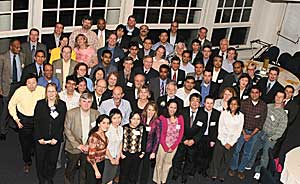  |
| HOME | THIS ISSUE | CALENDAR | GRANTS | BACK ISSUES | < BACK | NEXT > |
Doctoral program in business growing as demand increasesby David Bauman - April 9, 2007
|
||||
| The Ph.D. business has never looked better for UConn’s School of Business. What began as a small doctoral initiative in the fall of 1987 has grown into an internationally recognized program, as the demand for business faculty with Ph.D.’s has risen around the world. To celebrate, the UConn School of Business recently hosted a daylong reception for its alumni – 120 to date – faculty, and students. The event featured panel discussions led by current doctoral students and sessions to facilitate networking with alumni. “If you told me 20 years ago where we would be now, I wouldn’t have believed it,” says Gary Powell, a professor of management and director of the Ph.D. program. “We couldn’t let a milestone go by without looking at how far we’ve come in such a relatively short period of time.” But getting here almost didn’t happen, adds Powell, who has been involved with the program from its beginning. The proposal to create a Ph.D. program was initially viewed by many faculty as an “undesirable distraction,” he says. “It was approved by a secret ballot in a faculty meeting so people wouldn’t feel intimidated.” “At the start, we were primarily a regional program,” Powell says. “Our applicants were from New England, and looked for jobs in the region.” But as UConn’s School of Business has grown from a regional business school into one of broader reach – reflected in top rankings in publications such as Business Week, U.S. News & World Report, and The Wall Street Journal that place UConn among the top 4 percent of more than 1,400 business schools worldwide – the doctoral program has increased its aspirations, Powell says. Currently, 58 students are in the program, which offers five concentrations – accounting, finance, management, marketing, and operations and information management – with 82 full-time faculty with research doctoral degrees as major advisors, and alumni who span the globe. The doctoral students’ average age is 33 years; and just over half come from outside the United States. “We’re not regional any more,” notes Powell. A growing number of business schools in the U.S. and abroad are looking for American-trained faculty with doctoral degrees to teach their students. “Talk about trade imbalance,” he says “We import many more graduate students to our doctoral program than we export. There are a lot of foreign universities trying to emulate what we do here.” Tight budgets at U.S. institutions have led many business schools to cut back their doctoral business programs, which are expensive. These cuts have triggered warnings of a looming shortage of Ph.D.-qualified faculty from the Association to Advance Collegiate Schools of Business (AACSB), the group that accredits collegiate business schools.
Two years ago, U.S. business schools graduated 907 Ph.D. students, down from 973 six years ago, according to the ACCSB. To make matters worse, about a third of those students opted for corporate careers rather than academia. The resulting faculty shortage has driven the average starting salary for new faculty with a business doctorate from $64,000 in 1997 to $93,780 in 2005, the AACSB reports. Graduates of doctoral programs in high-demand fields, such as accounting or finance, can earn as much as $160,000 in their first year of teaching. In contrast to declining support for doctoral programs elsewhere, UConn’s backing for its School of Business’ Ph.D. program is growing, says Nancy Crouch, administrative manager of the program: “Our plan is to increase the quantity of doctoral student assistantships by 25 percent in the next few years. UConn has a very competitive assistantship stipend, with an annual stipend of up to $21,370 offered to some students. Institutional support also provides funding to bring promising applicants to the Storrs campus for a visit during the recruitment phase, Crouch says. “This is a very useful device to attract top applicants.” The Ph.D. program also will provide $500 per year to each doctoral student to defray travel expenses to attend professional conferences. “At whatever stage of they are in the program, if they get a research paper accepted by a conference, we’re going to give them the money so they can present the paper,” says Powell. In addition, a new account ahs been created at the UConn Foundation for gifts to the program, to be used for enrichment activities in the business Ph.D. program. The doctoral program emphasizes exposing students to the research process and encourages them to submit papers to professional conferences and articles to scholarly journals as a means of developing research skills and building an academic vita, he adds. “We train our doctoral students to do original scholarship and be excellent at communicating that knowledge,” he says. “Our mission is to prepare our students to conduct high quality, state-of-the-art research, and to assume faculty positions at leading universities.” The focus on training business faculty has resulted in the Ph.D. program’s becoming recognized internationally, Powell says: “Virtually all of our graduates are faculty somewhere.” “The number of doctoral students we admit is roughly equal to the number of faculty doing research,” he says, “so it’s more of a one-on-one experience for the students. Our program is small, but we’re growing.” |
| ADVANCE HOME |

